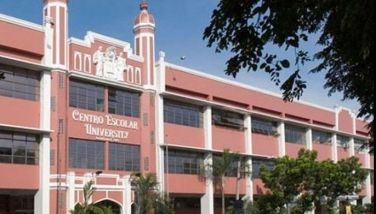Gov’t to cushion EVAT impact
December 30, 2005 | 12:00am
Malacañang is set to implement more mitigating measures to cushion the impact of an expected increase in the expanded value-added tax (EVAT) rate from 10 to 12 percent by Feb. 1, economic managers said yesterday.
In separate interviews, Socio-Economic Planning Secretary Augusto Santos and Budget Secretary Romulo Neri said President Arroyo would preside over a Cabinet meeting on Monday at the Palace to finalize the measures.
"These measures are on top of those already implemented earlier," Santos said in a telephone interview.
He explained that the increase in the prices of basic commodities and other goods is mainly due to high oil prices and not the EVAT.
Government economic managers project an inflation rate of 8.1 to 8.5 percent once the 12-percent EVAT rate is implemented.
Santos and Neri, however, did not disclose the additional measures the government is planning to cushion the impact of higher EVAT, saying these would be announced once they are finalized.
In Baguio City, two members of Mrs. Arroyo’s economic team gave assurances that the impact of the 12 percent EVAT on prices of fuel, electricity and basic goods would be minimal and would not be felt sharply by consumers.
Energy Secretary Raphael Lotilla and Trade Secretary Peter Favila said the President met them in Baguio to discuss the impending increase of the VAT rate and to make sure vendors and businesses would not take advantage of the public.
Lotilla and Favila told reporters the feared price increases would be minimal. Businessmen, they said, might even consider absorbing the increase because two percent is so small.
Favila said they would ensure that food supplies remain adequate and readily available to forestall surges in the prices of commodities.
Republic Act 9337 or the Reform VAT Law signed last May by Mrs. Arroyo gives her the authority to increase the value-added tax rate to 12 percent in 2006. The government aims to raise P80 billion to P120 billion next year from the tax.
Finance Secretary Margarito Teves said last week that the increase would push through despite the clamor of some sectors to defer the increase because of recent hikes in prices of basic commodities.
He said the government could end up losing P35 billion annually if it suspends increase of the EVAT rate.
Santos earlier said proceeds from the EVAT would allow the government to increase infrastructure spending to generate jobs and pump-prime the economy.
Favila, for his part, said revenues from EVAT would trickle down to the people in the form of better health and social services, quality education and agri-infrastructure facilities.
Before Christmas last week, the President issued separate memos to members of her Cabinet including Teves, Lotilla, Favila, Labor Secretary Patricia Sto. Tomas, Agriculture Secretary Domingo Panganiban, Health Secretary Francisco Duque, and Social Welfare Secretary Lualhati Pablo, to implement a series of measures to help protect low-income earners from the high cost of living.
These measures include the exemption of minimum-wage earners from withholding tax; acquiring compressed natural gas-powered buses to be used as shuttle service for government employees; intensifying price-monitoring activities; facilitating the transport and sale of agricultural products and goods in markets; and selling medicines at lower prices in government outlets. — Paolo Romero, Aurea Calica
In separate interviews, Socio-Economic Planning Secretary Augusto Santos and Budget Secretary Romulo Neri said President Arroyo would preside over a Cabinet meeting on Monday at the Palace to finalize the measures.
"These measures are on top of those already implemented earlier," Santos said in a telephone interview.
He explained that the increase in the prices of basic commodities and other goods is mainly due to high oil prices and not the EVAT.
Government economic managers project an inflation rate of 8.1 to 8.5 percent once the 12-percent EVAT rate is implemented.
Santos and Neri, however, did not disclose the additional measures the government is planning to cushion the impact of higher EVAT, saying these would be announced once they are finalized.
In Baguio City, two members of Mrs. Arroyo’s economic team gave assurances that the impact of the 12 percent EVAT on prices of fuel, electricity and basic goods would be minimal and would not be felt sharply by consumers.
Energy Secretary Raphael Lotilla and Trade Secretary Peter Favila said the President met them in Baguio to discuss the impending increase of the VAT rate and to make sure vendors and businesses would not take advantage of the public.
Lotilla and Favila told reporters the feared price increases would be minimal. Businessmen, they said, might even consider absorbing the increase because two percent is so small.
Favila said they would ensure that food supplies remain adequate and readily available to forestall surges in the prices of commodities.
Republic Act 9337 or the Reform VAT Law signed last May by Mrs. Arroyo gives her the authority to increase the value-added tax rate to 12 percent in 2006. The government aims to raise P80 billion to P120 billion next year from the tax.
Finance Secretary Margarito Teves said last week that the increase would push through despite the clamor of some sectors to defer the increase because of recent hikes in prices of basic commodities.
He said the government could end up losing P35 billion annually if it suspends increase of the EVAT rate.
Santos earlier said proceeds from the EVAT would allow the government to increase infrastructure spending to generate jobs and pump-prime the economy.
Favila, for his part, said revenues from EVAT would trickle down to the people in the form of better health and social services, quality education and agri-infrastructure facilities.
Before Christmas last week, the President issued separate memos to members of her Cabinet including Teves, Lotilla, Favila, Labor Secretary Patricia Sto. Tomas, Agriculture Secretary Domingo Panganiban, Health Secretary Francisco Duque, and Social Welfare Secretary Lualhati Pablo, to implement a series of measures to help protect low-income earners from the high cost of living.
These measures include the exemption of minimum-wage earners from withholding tax; acquiring compressed natural gas-powered buses to be used as shuttle service for government employees; intensifying price-monitoring activities; facilitating the transport and sale of agricultural products and goods in markets; and selling medicines at lower prices in government outlets. — Paolo Romero, Aurea Calica
BrandSpace Articles
<
>
- Latest
- Trending
Trending
Latest
Trending
Latest
Recommended





























